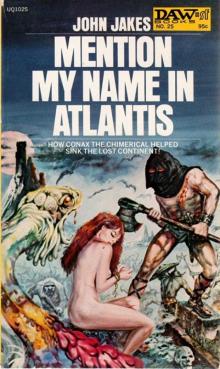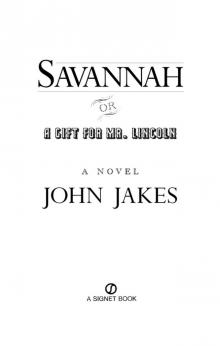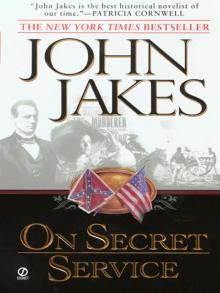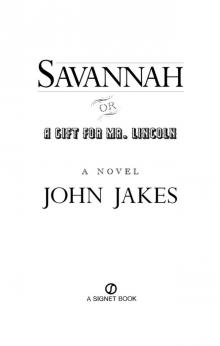- Home
- John Jakes
Homeland Page 4
Homeland Read online
Page 4
The young officer tucked his notebook into his belt, pulled out a flat gold case and offered it to his superiors. The brigadier and major took cigarettes. When the lieutenant turned to hold a match for the brigadier, Pauli saw a scar, hook shaped, on his left cheek. Probably he’d gotten it at Heidelberg, in one of the Burschenschaften, the elite student fraternities. They were notorious for demanding that members regularly engage in saber duels. A scar was a mark of prowess, a badge of honor.
“Twenty-eight minutes, hmm,” the brigadier murmured, blowing smoke. “That is not impressive.”
The major said, “We didn’t see them arrive, perhaps the train was late.”
“Arrival from Braunschweig was only six and one half minutes behind schedule,” the lieutenant said. “I consulted several switchmen to confirm it.”
“That would never do for artillery arriving in the field,” said the brigadier. “Lieutenant von Rike, kindly ask a few more questions. Ascertain, if you can, the reason they have lost almost twenty-two minutes.”
The lieutenant snapped his hand to his cap, then pivoted. Pauli stepped aside, but not in time. The officer had his eye on the train and didn’t see Pauli until he blundered into him.
“I’m sorry, sir,” Pauli began. Color rushed into the lieutenant’s cheeks. His hands and clothing gave off a tobacco smell as strong as Rhukov’s. He grabbed Pauli’s collar and flung him down on the gravel. A sharp stone nicked Pauli’s cheek, drawing blood.
“In the future be more observant, you little dumbhead.”
Angry, Pauli started to jump up. Before he could, Rhukov stepped in.
“That was uncalled for. The young man bumped you by accident.”
The lieutenant eyed Rhukov up and down. “We don’t need advice from dirty foreigners.”
For all his peculiarity, Rhukov was brave. He didn’t move. “You need a lesson in deportment, I’m afraid. An apology to this boy would be in order.”
“Fuck your apologies. When the day arrives, we’ll deal with your kind. Now stand aside.” He pushed Rhukov and stalked by.
The journalist stretched out one yellowed hand to help Pauli rise. The other officers were giving them threatening looks. Rhukov sneered and turned his back.
“Thank you,” Pauli said, trying to smooth his unruly hair.
“Don’t mention it.”
“Do you know what he meant when he said ‘the day’? He made it sound important.”
“The day? It is important. I’ve seen it written with the D capitalized. It’s the day some of your countrymen think about all the time. The Day is that day in the future when they fancy they’ll get their own back. Punish all their enemies. Take all the territory they want and believe they deserve. Come on, move away.”
Rhukov guided him a safe distance from the officers, talking the while. “What a bunch of strutting popinjays. Just imagine what dreams dance around in their heads. Invincible Teutonic knights in Prussian castles raising black falcons to hunt and kill. Emperor Barbarossa sleeping under his mountain, ready to waken and lead, the moment Germany needs a savior. What shit. The problem is, I think they believe it. I fear the Kaiser and the whole army believe it. You Germans are a people mired in myths. Myths of superiority. Myths of the grandeur of war, the nobility of death. Not to mention Herr Wagner’s water nymphs, magic gold, and sublime heroes who fuck their sisters. I beg your pardon, I hope you’re not too young for such language.”
“I’ve heard it before.” Pauli decided this fellow had some substance, seedy as he was. He certainly knew a lot about Germans and Germany. Or acted like he did. He also liked the sound of his own voice.
Rhukov lit his next cigarette. “Mark my word, German myths will destroy Germany one day—if they don’t destroy the rest of the world first. Of course we can count on a slight reprieve, because they’ll start with revenge against the French. I refer primarily to the German high command, you understand. The generals, plus their strongest allies, the nobility. You’re exempted. You may be a rotten artist, but you seem a decent sort otherwise.”
“Thank you very much.” Pauli’s sarcasm amused Rhukov. He gave a grudging smile.
“You’re a tough little nut. Where’s your home?”
“I don’t know,” Pauli snapped. “I don’t want to talk about it.” For the first time Rhukov was caught short. Pauli enjoyed it.
Lieutenant von Rike returned, marching by stiffly and glaring at them. “The delay was not their fault,” he announced to his superiors. “It lay with the yardmaster. He misinterpreted instructions and didn’t have the switch engine here on schedule.”
Rhukov put his notebook away. “I’ve seen enough. I can write a page or two. Goodbye, my friend.” He extended his hand and they shook in a formal way.
“I will see you again,” Rhukov said. He strolled away toward the head of the train, down the center of a wide gravel area. He tipped his derby when he passed Fräulein Oakley. Curious fellow. Some of his pronouncements about the future were alarming.
Activity at the train distracted Pauli for a few seconds. When he looked again, Rhukov had vanished from the open area, as if he were no more than smoke in a windstorm. It was spooky.
What a strange man. Just a little while ago, when they first met, Pauli was repelled. Now he was sorry Rhukov was gone. He had the oddest feeling that they would indeed meet again somewhere.
Pauli went back to his perch in the open boxcar, but he gave up further sketching. The Brigadegeneral and his men returned to observing the Wild West train. All the show wagons had been unloaded and lined up, and now the horses, donkeys, bison, deer, and elk were being led from their cars, which had doors in each end.
The morning was well advanced. Pale yellow sunshine spilled over the fuming chimneys of the ugly cement barracks-apartments nearby. Colonel Cody had disappeared, but Fräulein Oakley continued to exercise her poodle, accompanied by a man in a fringed jacket. Pauli recognized him. Fräulein Oakley’s husband, the marksman Butler. Several Indians stood chatting. All of them wore ordinary jeans pants. Two had suit vests. Very disappointing.
Now suddenly there came another diversion. A group of four well-dressed tourists, two men, two women, pointing and chattering. One man carried a small black box. Pauli jumped down from the boxcar in order to move closer again.
“Engländer,” said the brigadier.
“Nein, mein General. Mit respekt—Amerikaner.” The major said something else, and the men responded with smiles and chuckles.
The visitors were finely dressed. The gentleman with the black box wore a tall hat and velvet-collared chesterfield, the second man a sporty Norfolk jacket and knickerbockers with a strong brown plaid on a tan ground, and white linen spats. One of the ladies was drab, but the other won Pauli’s admiration with her dress of Venetian red and matching toque decorated with a stuffed gray bird. She’d gotten gravel dust all over her hem; the sporty man went to his knees to brush it away. The tall-hatted man, meantime, leaned over his black box, which he aimed at the Indian in the silk hat. The Indian put his left hand under his lapel, Napoleon-style, and raised his right hand.
Fräulein Oakley’s companion approached the photo maker. Butler asked a question; Pauli thought he heard Butler say the word American.
The tourist nodded vigorously; introduced himself. His name was something like Jasper or Jaster. The latter, Pauli decided. He heard a reference to a place called Syracuse, New York.
Colonel Butler and the tourist shook hands. The marksman was interested in the black box. Pauli heard the words George Eastman Kamera.
Jaster nodded to Butler. “A Kodak.” Kodak was a strange word, but Pauli had heard it before, from Herr Trautwein at the hotel. Herr Trautwein bragged about his Kodak Kamera from America. The new word with its hard knife-blade sound was easy to remember.
Jaster’s wife urged him to show Butler the camera. Somewhat reluctantly, Jaster handed it over. Butler examined it, then whistled. He bounced it on his palm to show its light weight.
; Jaster snatched the camera back, on the pretext of showing Butler how simple it was to take a picture. Because Jaster was a man who spoke with broad gestures, Pauli thought he understood. You simply pressed a button on the box to magically produce a picture. It was an exciting thought.
Jaster indicated that he wanted to photograph Butler and his wife. The marksman was flattered. He waved to Fräulein Oakley. She joined them, dragging her leashed poodle. Jaster’s wife posed with the performers, then the Butlers excused themselves. The tourists circulated up and down the length of the assembling procession of animals and wagons, yawning cowboys wearing sombreros and colorful neckerchiefs, twelve men in United States Army blue, four booted and fur-hatted Cossacks, or very good imitations thereof. The Indians reappeared in shirts and leggings of animal hide, their faces decorated with multicolored slashes of paint. Feathers on their enormous war bonnets fluttered in the light air.
Pauli followed the tourists, almost delirious from the thrill of seeing both the Buffalo Bill troupe and a genuine Kodak camera. He didn’t know how a camera worked, but he understood what it did. It produced those breathtaking views of other people, other places, which decorated his bedroom wall. A camera brought the whole world into the parlor of ordinary persons like Aunt Lotte and himself.
Herr and Frau Jaster and their friends passed between Pauli and the shining Deadwood coach, now hitched to six snorting horses. Pauli reminded himself that he was due at the Kaiserhof at half past seven. How could he hope to keep his mind on slop buckets and swabbed floors, having witnessed so many exciting things?
Jaster’s wife wanted a photograph of the German officers. Jaster stopped about ten feet from them, and they suddenly took notice. The brigadier waved sharply.
“You there,” he called in German. “Stop that. No photographs of officers on duty.”
“What’s he saying?” asked the sporty man. Jaster lowered his camera but his wife jabbed him with a gloved finger. She didn’t want him to back down so easily.
The officers looked annoyed. Pauli couldn’t understand why they should object to being photographed, unless it was their usual arrogance coming into play. The scowls and dark glances didn’t seem to deter Herr Jaster, who went on readying his shot.
“Someone stop him,” the brigadier said. The lieutenant, von Rike, thrust his notebook in his pocket. “Teach him a lesson while you’re at it.”
The lieutenant rushed forward and violently tore the Kodak from Jaster’s hands. Frau Jaster shrieked in alarm.
Her husband lunged for the camera. Von Rike feinted to the left gracefully, drew Jaster off guard, then jumped back while prying the box open. Agog, Pauli watched the lieutenant whip out a long paper streamer with a dark coating on one side. Von Rike dropped the camera and stamped on it. Frau Jaster wailed.
Jaster was in a fury. Although he was twenty years older than the lieutenant, he hoisted his fists and swung a right without hesitation. Von Rike drew approving exclamations from his colleagues by simply stepping out of the way. When Jaster swung a second time, von Rike knocked off his tall hat and smacked Jaster’s forehead with his palm. It jolted the tourist and threw him off balance. He fell on his right knee.
The lieutenant walked back to his comrades and took his place, having done his duty. The brigadier offered no special compliments or approval. The major did, though; a terse “Neatly done.”
“Thank you, sir. The best medicine for obstinacy is the one His Majesty prescribes. The mailed fist.”
The brigadier chuckled approvingly, then gestured at the Americans, ordering them away. Herr Jaster was cursing and protesting as his friends helped him up. He wanted to resume the fight but they restrained him. A minute later the backs of the four tourists could be seen retreating around the corner of a switchman’s shack.
Pauli perched in the boxcar doorway once more. The officers closed their notebooks and they too soon strolled out of sight behind the Wild West train, the junior officers trailing their superiors at a respectful distance. Pauli thanked heaven that he didn’t have to be a soldier. He wouldn’t want to take orders from some hothead who destroyed property and abused people without a qualm.
Colonel Cody came out of his car, resplendently dressed in knee-high boots, whipcord trousers, fringed buckskin coat enlivened by Indian beadwork and quills, flowing neckerchief and sombrero. Mounting Isham, he trotted up and down the line of the assembled parade, bellowing more instructions. He sounded cross.
Pauli’s fascination with the Wild West show was waning, replaced by intense concentration on the object he feared to stare at because someone else might notice. The camera. Smashed; ruined. But a real camera. Abandoned there in the gravel …
With a popping of whips and a creaking of axles, the cavalcade began to move out of the yards, bound for the morning parade down Unter den Linden. Pauli’s mouth was as dry as fireplace ash. Eyes darting, he eased down from the boxcar, then ran to the camera, snatched it up and sped away. He knew the camera was no longer any good, yet it was a rare treasure.
He sensed that he was late for work. He alternately ran and walked to the tram stop, eager to reach the Kaiserhof for once, and show his prize to Herr Trautwein.
It was four o’clock before he had a chance to sneak out of the kitchen to the cubicle behind the hall porter’s desk. Herr Trautwein rhapsodized over the camera.
“Yes, this is a genuine Eastman snapshot camera, a Kodak Number One, like mine. Do you realize what a marvel it is? It weighs less than a kilogram, takes one hundred round photographs on a roll of paper film that’s packed inside the camera before you buy it. When you finish the roll you send the camera to the factory in America—I have done that, twice!—they develop the pictures, pack in another roll and send back the whole affair. Eastman has a slogan. ‘You push the button and we do the rest.’ It’s entirely true. Photography is the new art of the new age. It’s too bad you couldn’t have found a Kodak that works.”
“I’d like one someday,” Pauli said. He was fascinated by the slogan Trautwein had quoted. He had made a sudden and stunning leap in his head from “You push the button,” to all the photographs on the cards on his wall, and from there to his constant and frustrating attempts to draw. To make photographs might be the answer. The way to capture a piece of the world when you had no talent, only one strong finger for the button.
He left the hotel at half past eight that night. Forgotten for the moment were Aunt Lotte’s strange moods and deeds, the sense that she no longer wanted or cared for him. His enthusiasm possessed him, to the exclusion of everything else.
He found his aunt in her wrapper, seated like a lost child in the front room, an empty beer glass in hand. Her eyes were red raw from crying.
“Aunt Lotte, what’s the matter?”
“Nothing, Liebchen. Everything’s fine.” She turned away from him.
“I can see things aren’t fine at all.” He pulled an old footstool near her and sat down. “You must tell me. What’s wrong?”
She covered her eyes. “Herr Reynard.”
“Did he hurt you?”
“No, he didn’t touch me, he just—oh, Pauli.” Weeping, she mussed his hair affectionately. “How can I explain? It’s so sordid.”
He rested his hands on her knees, and felt her trembling. “It’s—all right.”
Presently his aunt composed herself. “Pauli, do you know the meaning of the word ‘consumption’?”
“I’ve read it in the newspapers. It’s a kind of sickness.”
“Yes, a terrible sickness that affects a person’s lungs. It wastes you away. I have it. I’ve known for over a year. I’ve debated many a night about telling you, but now I must, because I don’t want you to fall ill. You mustn’t stay in this apartment until it becomes a pesthole. Also, because of my sickness, other things are going bad.”
She walked to a Biedermeier cabinet gleaming with elaborate fruitwood veneer. It was her best piece, bought at an open-air furniture market. She found a packet of French cigarett
es and lit one.
“This evening, after we had supper, Herr Reynard wanted to embrace me again, is that a decent way to say it? I had another spasm, the worst yet. I stained the bolster. Ruined it completely. Herr Reynard was disgusted. He cursed and walked out without leaving me so much as one mark.”
She leaned close to him. “He said he was never coming back. He said that I belonged in a hospital. He said he’d blacken my name in the hotels and cafés where commercial travelers congregate. Soon no gentlemen will want to visit me. So you see—”
She puffed on the cigarette.
“We must make a different arrangement for you.”
The room, the whole cellar, was absolutely still. Pauli felt something momentous was about to happen.
“It’s out of the question for you to go back to Aalen, to your Uncle Gerhard. He’s a narrow, stupid man. I’d sooner turn you out in the streets. What I think, Pauli—what I think is this.”
She touched his cheek.
“You must go to America.”
“America!”
“Yes, why not? It’s a wonderful land of opportunity, hundreds of thousands of our people have gone there, and more are leaving every week. Don’t forget we have a relative in the city of Chicago, my brother Josef, the brewer. He’s rich and important. I’ll write him this very night, and I’ll pray he won’t dismiss the letter. I haven’t kept in good touch with my family, you see.” He understood the reason. Perhaps the family members were glad. Perhaps they knew about her business with Herren …
He was excited. The house of his uncle might be the very home he longed for. On the other hand, his aunt’s illness was something he couldn’t overlook.
“I can’t leave you when you’re feeling so—”
“Of course you can. You’re almost grown, you’re quick and strong, furthermore, you can make the journey by yourself. Your uncle did. Is the idea of America so terrible?”

 The Bastard
The Bastard The Furies
The Furies The Bold Frontier
The Bold Frontier The Americans
The Americans Mention My Name in Atlantis
Mention My Name in Atlantis California Gold
California Gold North and South
North and South Savannah, or a Gift for Mr. Lincoln
Savannah, or a Gift for Mr. Lincoln Heaven and Hell
Heaven and Hell Homeland
Homeland On Secret Service
On Secret Service The Lawless
The Lawless The Titans
The Titans The Seekers
The Seekers Love and War
Love and War North and South: The North and South Trilogy (Book One)
North and South: The North and South Trilogy (Book One) North and South Trilogy
North and South Trilogy Love and War: The North and South Trilogy
Love and War: The North and South Trilogy North and South: The North and South Trilogy
North and South: The North and South Trilogy Savannah
Savannah Lawless
Lawless Conquest Of The Planet Of The Apes
Conquest Of The Planet Of The Apes Love and War: The North and South Trilogy (Book Two)
Love and War: The North and South Trilogy (Book Two) The Rebels: The Kent Family Chronicles
The Rebels: The Kent Family Chronicles Heaven and Hell: The North and South Trilogy
Heaven and Hell: The North and South Trilogy Planet of the Apes Omnibus 2
Planet of the Apes Omnibus 2 The Bastard: The Kent Family Chronicles
The Bastard: The Kent Family Chronicles Heaven and Hell: The North and South Trilogy (Book Three)
Heaven and Hell: The North and South Trilogy (Book Three)